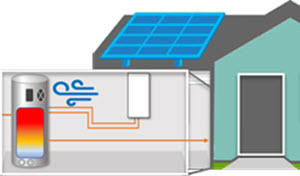
Water heaters are typically the second highest source of energy used in residences, behind heating and cooling systems. Water heaters with new energy-efficient heat pump technology are a highly efficient way to heat water, offering a reduction in energy usage and utility bill savings when compared to electric resistance water heaters.
Benefits of Heat Pump Water Heaters (HPWHs)
Save Energy | In comparison to their standard electric resistance counterparts, HPWHs can be three times more efficient. HPWHs are also three to four more efficient than traditional gas water heaters — which suffer energy loss during the venting process.
Save Money | Energy efficient HPWH can reduce energy bills in new construction, single-family homes by 15-24% annually, compared to gas storage water heaters.
Get Control | With enhanced technology, users can create customized settings by day, week, or month, and even control temperature settings via a mobile app.
Health and Safety First | HPWHs avoid some hazards present with gas water heaters, such as gas leaks. Additionally, with gas water heaters, poor ventilation can also release toxic carbon monoxide and excess moisture into the home (which may result in mold and mildew).
Help the Environment | Gas-powered water heaters emit greenhouse gases into the atmosphere when used. With increasing amounts of renewable wind and solar resources, electric-powered HPWHs significantly reduce emissions and climate pollution.

Heat pump water heaters pull heat from the air to heat the water.

Operating Modes for Added Efficiency
HPWHs come with a variety of operating modes that maximize energy efficiency while also keeping up with household demand or preferences. Operating modes help households balance energy costs with resident needs.
Heat Pump Only | This mode offers the highest energy efficiency. It relies solely on the heat pump to heat the water.
Hybrid | This mode maintains high energy efficiency while introducing flexibility of response. It uses the heat pump to heat water but also allows the electric resistance heating element to engage under high-demand circumstances.
High Demand/Boost | This mode is like the Hybrid mode, but the electric resistance heating element is energized sooner.
Electric Resistance Only | This mode offers the greatest demand response but the least energy efficiency. It constantly relies on the electric resistance heating element, like standard electric water heaters.
Vacation | This “sleep” mode saves energy during times when residents are away from home for multiple days.
When is it a good time to consider installing an HPWH?
Consider installing an HPWH when your current water heater is close to the end of its useful life (10-12 years). If you are installing a rooftop photovoltaic system or an electric vehicle charger at your home, you may want to consider having the electrician run a 220/240V circuit from the electric service panel to the location of the water heater to be HPWH-ready. However, retrofit-ready 110/120V HPWHs are also available in the market today, so evaluate them based on your household’s needs.
How Reliable is an HPWH?
HPWHs retain high-reliability ratings, with 10-year warranties available from most manufacturers. During rare power outages, hot water production can be uninterrupted when connected to a solar and/or battery storage system. A 120V HPWH can additionally be connected to a portable electric generator, battery, or EV in this instance as well. In the case of no backup power, the HPWH will still retain hot water for use until the water tank is depleted, allowing for further use during an outage.
Why does an HPWH have a condensate drain?
Just like an AC unit, HPWHs create condensation as an output, requiring a condensate drain to remove the excess water. The simplest option for condensate management is a hose connected to the condensate line and pitched downward toward a drain in the floor or to the outside if there are no issues with yard drainage. Alternatively, a condensate pump can be installed to drain the water into a sink
Tips for converting to an HPWH
Here are some aspects to consider when converting to an HPWH. Please be sure to consult a professional to ensure the safe and effective installation and operation of your equipment.
- Location | Many heat pump water heaters can be installed in the same spot as a current standard electric or gas heater. You can also take advantage of existing connections, such as cold-water supply, hot-water outlet, electrical connection, and drain. For new locations, HPWH typically requires at least 1,000 cubic feet of air flow around them, making garages and basements ideal locations.
- Electrical | Some HPWHs require a dedicated 30-amp breaker and a 240V electrical circuit from the electrical panel to the location of the HPWH unit however, 120V retro-fit ready HPWHs are available on the market today
- Sizing | While a household of three to four people might utilize a 50-gallon gas water heater, the best option for the same household would be an 80-gallon HPWH. The bigger tank allows the HPWH to support higher water draw volume without the need to operate in the hybrid mode.
- Sound | Heat pump water heaters generate sounds at a low level, similar to the background noise from a portable fan (around 45 decibels). When installed in a separate living space, very few homeowners are aware they are operating.
For More Information
Learn more about Home Electrification, potentially thousands of dollars in incentives, and pre-certified contractors in your area at switchison.org.
Sources
Residential Building Electrification in California, Energy, and Environmental Economics, Inc., April 2019
https://www.energy.gov/energysaver/articles/which-water-heater-right-you
https://news.energysage.com/pros-cons-electric-water-heaters/
© Southern California Edison. All rights reserved.

